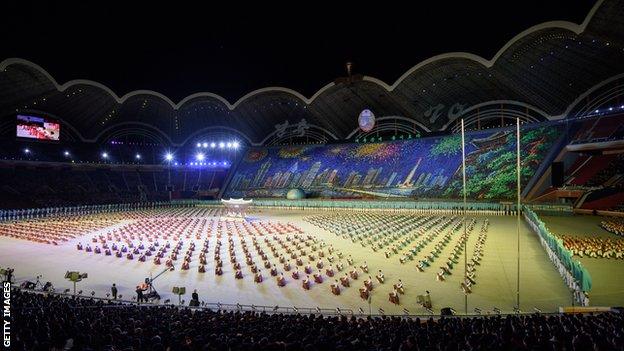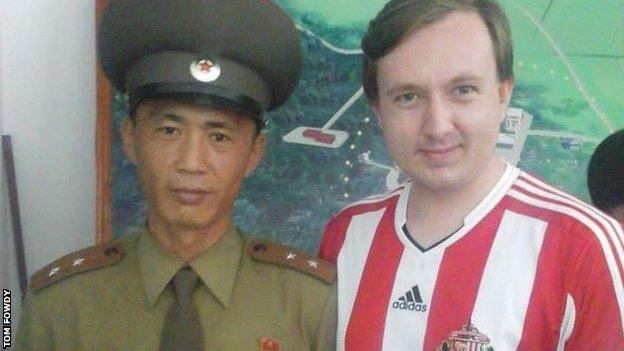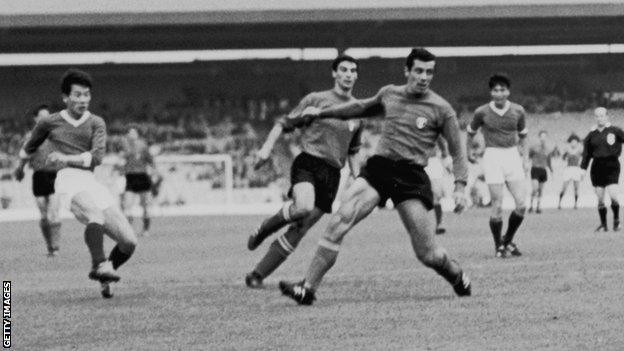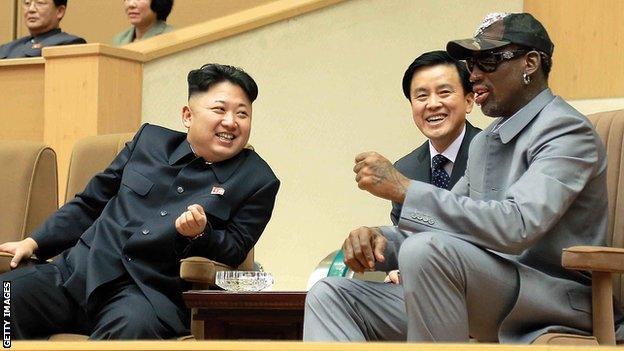Sunderland's North Korea fan club: Supporter aims to build fan base
- Published

Pyongyang's 114,000-capacity May Day Stadium, which hosts the country's 'Mass Games', is the largest capacity stadium in the world. It holds more fans than Sunderland's Stadium of Light and rivals Newcastle's St James' Park combined
North Korea is never far from the headlines - leader Kim Jong-un's secretive regime both concerns and captivates other countries.
But while Donald Trump's talks with Kim may have ended without agreement last week, one thing that seems to be progressing is an unlikely relationship with League One football club Sunderland.
It is thanks to Tom Fowdy, a Sunderland native and Oxford graduate in Chinese Studies, who set up a firm encouraging westerners to visit the 'hermit kingdom'.
"I felt inspired to reach out and share the passion of my football team with North Korea," Fowdy told BBC Sport from Seoul in neighbouring South Korea.
"North Koreans do love football, it's their national sport and it's the most popular sport in all of the Korean peninsular - their awareness of football is bigger than what we think.
"It's the first football club to ever even think of it, so it's very unique and I feel quite confident that we can make an impact," he said.
World Cup chat with a North Korean soldier

Tom Fowdy has been spreading the word about Sunderland in North Korea since 2014
The North Koreans have twice qualified for the World Cup - in 1966 and 2010 - and Fowdy says football-related items can be found north of the 38th parallel.
"They quite welcome goods coming into the country providing they aren't of a political nature," he explains.
"I've seen Barcelona shirts, Brazil team merchandise and many North Koreans like to attach themselves to the biggest Premier League clubs.
"When I first went to North Korea in 2014 it was on the week that England had got knocked out of the World Cup in Brazil.
"The soldier asked me some questions about this and he wanted to know why England had crashed out of the World Cup so early and he talked about Wayne Rooney, so they're not as closed off as we think."
North East football and North Korea

Pak Doo-Ik (left) scored the only goal as North Korea stunned Italy at Ayresome Park in the 1966 World Cup
North Korea and clubs in the north-east of England have a long association.
During the 1966 World Cup, the North Korean side were based in Middlesbrough and played all three of their group games at Ayresome Park, including a famous 1-0 win over Italy that took them to the quarter-finals.
In October 2002, members of that giant-killing team returned to Teesside for a visit, and in 2010, Middlesbrough Women became the first British side to play in North Korea when they went on a four-day tour.
Last December, National League North side Blyth Spartans - who are based 22 miles north of the Stadium of Light - began a sponsorship deal with Fowdy's firm, Visit North Korea.
"There's been some jokes about comparing Sunderland and North Korea, but I'm not sure what kind of serious comparison could be made seeing the politics and society are so different," says Fowdy.
"But you can be worlds apart in your respective life and worldview, yet you can at the same time be guided by a common passion by a football team and that power that lies in those kind of things offers great potential for the future."
Mackems in Pyongyang?

Dennis Rodman brought a team of US basketball players to play in North Korea in January 2014 - their exploits were documented in the film Big Bang in Pyongyang
North Korea leader Kim Jong-un is known to be a big basketball fan - Dennis Rodman has made a number of visits to the country and took a group of former NBA stars to play against a Korean team in 2015.
The chances of seeing Kim in a Sunderland shirt are virtually nil, and it is also highly unlikely many, if any, North Koreans have watched the Netflix documentary about the club's relegation from the Championship last season.
So what are the realistic aims for establishing a Sunderland fan base in a country where their games cannot be easily seen, if at all?
"The realistic long-term aim is to build a positive change by bringing people together," Fowdy adds.
"I want to help people transform how they think and experience the world in an open-minded way, both in the UK and North Korea, to have new experiences which bring people together and help foster greater understanding and trust which leads to a better world in general."